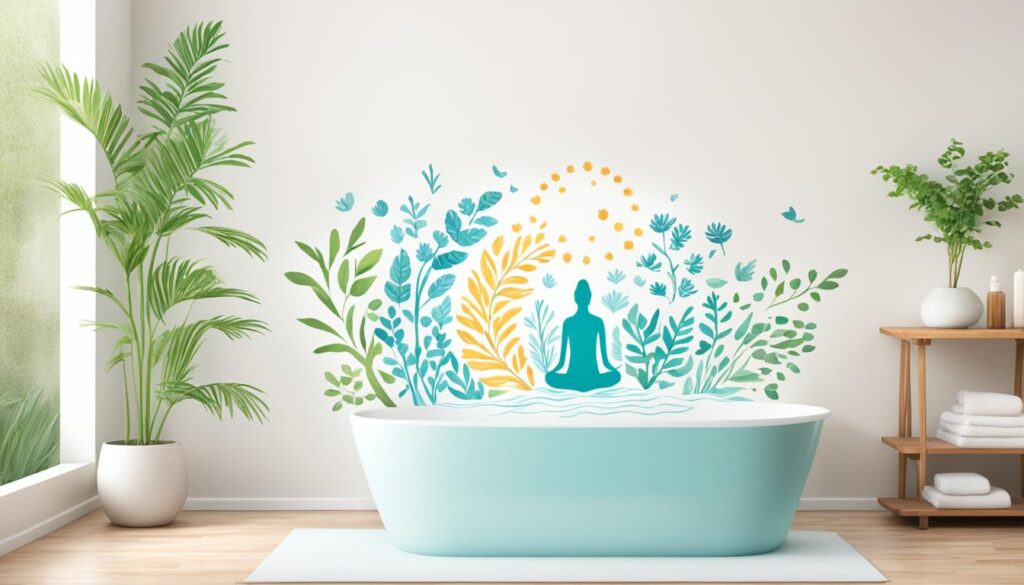“You yourself, as much as anybody in the entire universe, deserve your love and affection.” – Buddha
Self-care has become a buzzword in today’s fast-paced world, but what does it really mean? It goes beyond the occasional bubble bath or indulgent treat. It is a practice that encompasses taking care of your body, mind, and soul on a daily basis, not just when you’re feeling unwell. It involves prioritizing activities that promote well-being, nurturing yourself in ways that replenish your energy and restore your inner balance.
In a society that often glorifies busyness and puts the needs of others before our own, it’s easy to overlook the importance of self-care. However, taking the time to prioritize your well-being is not selfish; it is essential for maintaining overall health, happiness, and resilience. By investing in self-care, you can cultivate a strong foundation of self-love and compassion that ripples into every aspect of your life.
Key Takeaways:
- Self-care is more than indulgence; it is a practice of nurturing your body, mind, and soul.
- Prioritizing self-care is not selfish but essential for maintaining overall health and happiness.
- Investing in self-care cultivates self-love and compassion, which positively impacts all areas of life.
- Self-care involves engaging in activities that promote well-being and restore inner balance.
- By unlocking the meaning of self-care, you can become a better version of yourself.
Why Is Self-Care Often Challenging?
Self-care is essential for maintaining physical and mental health. However, many individuals find it challenging to prioritize self-care due to various reasons. Understanding these challenges can help overcome them and create space for self-care practices.
Busy Schedules and Stressful Jobs
One of the primary reasons people neglect self-care is their busy schedules and demanding jobs. The fast-paced nature of modern life leaves little time for relaxation and personal well-being. Balancing work, family, and social commitments often takes precedence over self-care activities.
Excessive Use of Technology
In the digital age, excessive reliance on technology can hinder self-care. Continuous exposure to screens, social media, and constant connectivity leads to reduced focus on personal well-being. The constant notifications, emails, and online commitments can make it challenging to disconnect and carve out time for self-care.
Feelings of Guilt or Selflessness
Many individuals feel guilty or selfish when prioritizing their own needs. They may perceive self-care as indulgent or neglectful of their responsibilities towards others. This mindset can lead to neglecting personal well-being and putting others’ needs before their own.
Overcoming these challenges requires a shift in mindset and a recognition of the importance of self-care. Prioritizing self-care is not selfish but necessary for maintaining overall health and happiness.
Take a moment to reflect on your own self-care challenges. Is it time constraints, excessive technology use, or feelings of guilt? By identifying these obstacles, you can start taking steps towards prioritizing your well-being.

| Self-Care Challenges | Reasons for Neglecting Self-Care |
|---|---|
| Busy schedules | Work, family, and social commitments take precedence |
| Stressful jobs | Fast-paced nature of work leaves little time for relaxation |
| Excessive use of technology | Constant notifications and online commitments |
| Feelings of guilt or selflessness | Perceiving self-care as indulgent or neglectful of others |
How Can You Engage in Self-Care?
When it comes to practicing self-care, there are numerous ways you can incorporate it into your daily life. It’s essential to find strategies that resonate with you and align with your individual needs. By making self-care a priority and incorporating it into your routines, you can nurture your well-being and achieve a more balanced life.
Ways to Practice Self-Care
- Get enough sleep: Prioritize restful sleep to rejuvenate your body and mind. Aim for 7-9 hours of quality sleep each night.
- Nourish your gut: Focus on proper nutrition to support your overall health. Eat a balanced diet rich in fruits, vegetables, whole grains, and lean proteins.
- Exercise regularly: Engage in physical activities that you enjoy to boost your energy, reduce stress, and improve your overall fitness.
- Learn to say no: Set boundaries and prioritize your needs by respectfully declining when you feel overwhelmed or stretched thin.
- Take self-care trips or breaks: Treat yourself to short getaways or mini-vacations to recharge and rejuvenate.
- Spend time outdoors: Connect with nature by going for walks, hikes, or simply enjoying the fresh air and sunshine.
- Enjoy the companionship of pets: Interact with animals to experience the therapeutic benefits they offer, such as reducing stress and improving mood.
Creating a self-care routine tailored to your preferences and goals is essential for maintaining your well-being. Remember, self-care is a personal journey, and what works for one person may not work for another. Take the time to explore various self-care practices and discover what resonates with you.

Through embracing self-care strategies and integrating them into your daily routine, you can cultivate a healthier, happier, and more fulfilled life.
The Importance of Self-Care
Self-care is crucial for your overall health and well-being. By prioritizing self-care, you can experience numerous benefits that positively impact your physical, mental, and emotional state.
Reduced Stress
Engaging in self-care activities helps to reduce stress levels. Taking time for yourself allows you to recharge and unwind, promoting a sense of calmness and relaxation.
Improved Mood
Self-care has the power to improve your mood and enhance your emotional well-being. By engaging in activities you enjoy, you cultivate positive emotions, foster a sense of fulfillment, and boost your overall happiness.
Increased Productivity
When you prioritize self-care, you actually increase your productivity. By taking regular breaks, practicing effective time management, and maintaining a healthy work-life balance, you’ll find yourself more focused, energized, and motivated to achieve your goals.
Enhanced Self-Confidence
Engaging in self-care activities boosts your self-confidence. By taking care of your physical and mental health, setting boundaries, and practicing self-compassion, you develop a strong sense of self-worth and belief in your abilities.
Better Physical Health
Engaging in regular self-care practices promotes better physical health. By prioritizing activities such as exercise, proper nutrition, and sufficient sleep, you can prevent chronic diseases, boost your immune system, and maintain a strong and healthy body.
Improved Sleep Quality
Self-care plays a crucial role in improving the quality of your sleep. By practicing relaxation techniques, maintaining a consistent sleep schedule, and creating a restful environment, you can enjoy better sleep, wake up feeling refreshed, and have more energy throughout the day.
Prioritizing Your Needs
Self-care allows you to prioritize your own needs, which is essential for your overall well-being. By investing time and effort into self-care activities, you acknowledge your worth and send a powerful message to yourself and others that your needs matter.
Fostering Self-Worth and Self-Compassion
Engaging in self-care activities fosters a sense of self-worth and self-compassion. By nurturing yourself and practicing self-love, you develop a deeper understanding and acceptance of who you are, leading to greater happiness and contentment.
| Benefits of Self-Care: |
|---|
| Reduced stress |
| Improved mood |
| Increased productivity |
| Enhanced self-confidence |
| Better physical health |
| Improved sleep quality |
| Prioritizing your needs |
| Fostering self-worth and self-compassion |
By recognizing the importance of self-care and embracing it as an integral part of your daily life, you can enhance your overall well-being and lead a more fulfilling and balanced life.

Taking Care of Your Mental Health
Self-care is not limited to physical well-being; it is also essential for maintaining strong mental health. Prioritizing self-care practices that promote mental well-being can have a profound impact on your overall happiness and quality of life.
Seeking Therapy or Counseling
One of the most beneficial ways to take care of your mental health is by seeking therapy or counseling. Talking to a trained professional can provide you with valuable insights, coping strategies, and a safe space to express your thoughts and emotions.
Practicing Mindfulness and Relaxation Techniques
Mindfulness and relaxation techniques, such as meditation, deep breathing exercises, and yoga, can help you reduce stress, enhance self-awareness, and improve mental clarity. These practices enable you to cultivate a sense of inner calm and promote emotional well-being.
Engaging in Hobbies and Activities That Bring Joy
Engaging in activities that bring you joy and fulfillment is essential for your mental well-being. Whether it’s painting, writing, playing an instrument, or gardening, carving out time for hobbies and passions allows you to recharge, express yourself creatively, and find moments of pure happiness.
Setting Boundaries
Setting healthy boundaries is crucial for protecting your mental health. Learning to say “no” when necessary, prioritizing your own needs, and avoiding excessive commitments can prevent burnout and foster a sense of balance and control in your life.
Prioritizing Social Connections
Developing and nurturing meaningful social connections is vital for your mental well-being. Surround yourself with supportive and positive individuals who uplift you and provide a sense of belonging. Engage in activities that allow you to connect with others, such as joining clubs, volunteering, or participating in group outings.
By recognizing and addressing your emotional and spiritual needs, managing stress effectively, and seeking support when necessary, you can prioritize your mental well-being and cultivate a healthier, happier mindset.

Incorporating Self-Care into Recovery
Self-care plays a crucial role in the journey of recovery. By setting specific self-care goals and aligning them with your recovery process, you can enhance your overall well-being and increase your chances of long-term success. Recovery is not just about abstaining from harmful substances or behaviors; it’s also about nurturing and healing your mind, body, and soul.
When incorporating self-care into your recovery, it’s important to identify goals that are relevant to your unique needs and challenges. These goals can range from improving physical and mental health to managing stress and fostering positive relationships. By setting these goals, you create a clear direction and purpose for your self-care practices, which can greatly contribute to your sense of accomplishment and motivation.
For example, if your recovery goal is to improve physical health, you might incorporate self-care activities such as regular exercise, nutritious eating, and adequate sleep into your daily routine. These activities not only promote physical well-being but also help restore your body’s natural balance and strengthen your resilience.
Similarly, if your recovery goal is to manage stress, you might explore self-care practices such as meditation, deep breathing exercises, or engaging in relaxing activities like reading, listening to music, or spending time in nature. These activities can provide a sense of calm and help you develop effective coping mechanisms when faced with stressors.
Building and sustaining positive relationships is another important aspect of recovery. Connecting with supportive friends, family members, or participating in support group meetings can be crucial for emotional healing and personal growth. By setting goals that involve fostering relationships, you prioritize self-care while also creating a support system that understands and encourages your recovery journey.
Creating balance in different areas of life is also an essential part of self-care in recovery. This involves setting goals for work-life balance, leisure activities, and personal growth. By prioritizing self-care in these areas, you ensure that you are not overwhelming yourself and have time for relaxation, hobbies, and personal development.
Self-care in recovery is not a one-size-fits-all approach. It requires self-awareness, experimentation, and willingness to adapt. What works for one person may not work for another, so it’s important to explore different self-care activities and find what resonates with you on a deeper level.
Remember, self-care is not selfish; it is essential for your overall well-being and sustainable recovery. By incorporating self-care into your recovery journey and setting meaningful goals, you empower yourself to take ownership of your health and happiness. Celebrate the progress you make along the way and embrace the transformative power of self-care.
| Benefits of Incorporating Self-Care into Recovery: |
|---|
| 1. Enhances overall well-being and happiness. |
| 2. Boosts motivation and resilience. |
| 3. Promotes physical and mental health. |
| 4. Supports stress management. |
| 5. Fosters meaningful relationships and social support. |
| 6. Creates a sense of balance in different areas of life. |
Strengthening Connections and Finding Joy in Self-Care
Self-care is not just about individual well-being, but it also encompasses strengthening connections with oneself, others, and the community. By prioritizing self-care and nurturing these connections, you can enhance your overall well-being and find joy in the process.
Connecting with Oneself
To truly take care of yourself, it’s important to check in with yourself regularly. Engage in self-reflection, journaling, and sharing your story. By understanding your own needs, desires, and aspirations, you can align your self-care practices with your authentic self.
Connecting with Others
Building supportive relationships is an essential part of self-care. Spend quality time with loved ones, engage in meaningful conversations, and share experiences. Join support groups or seek peer support to surround yourself with like-minded individuals who can provide guidance, understanding, and encouragement.
- Plan regular meetups with friends and family to strengthen bonds.
- Share your self-care journey and goals with a trusted friend or partner.
- Consider joining a support group or seeking professional counseling for additional support.
Connecting to the Community
Being part of a community can bring a sense of belonging and purpose. Get involved in community organizations, volunteer for causes you are passionate about, or pursue hobbies and interests that allow you to connect with others who share your passions.
- Participate in local events and activities to engage with your community.
- Volunteer your time and skills to contribute to a cause you believe in.
- Join clubs or organizations aligned with your interests to meet like-minded individuals.
By strengthening these connections and finding joy in self-care, you can create a meaningful and fulfilling life. Remember, self-care is not a selfish act but a necessary one that enables you to thrive and be the best version of yourself.
Conclusion
Self-care is not a luxury but a necessity for maintaining optimal physical, mental, and emotional well-being. By prioritizing self-care, you can unlock the key to a happier, healthier, and more balanced life. Engaging in self-care activities that align with your personal needs and goals allows you to reduce stress, improve your mood, boost self-confidence, and enhance overall health.
Practicing self-care is about more than just checking off a to-do list; it’s about making a conscious effort to nurture yourself and create a foundation of self-love and self-worth. By incorporating self-care routines, setting boundaries, and strengthening connections with yourself and others, you empower yourself to thrive and become the best version of yourself.
Remember, self-care is not selfish—it’s an act of self-compassion and self-preservation. Taking time for yourself, investing in your well-being, and prioritizing your needs is essential for long-term health and happiness. By embracing self-care, you embark on a journey of self-discovery, self-care conclusion, and self-growth, ultimately leading to a more fulfilling and satisfying life.

